“I joined Earth Wind & Fire at 18 and I actually met Maurice and Verdine when I was 15. Philip and I were playing together and Hilliard Wilson, who’s still the bass player for me today after 40-something years… (He whispers this comically). People used to tell me, ‘You were so instrumental in Earth Wind & Fire . . . You were the sound.’ I always said, ‘Slow your role. We had so many great musicians in EWF.’ But when a keyboard player walks, it is a lot of the sound.” – Larry Dunn

Interview Originally published in AGENDA Print Issue 11: The Legendary Larry Dunn turns 70 on Juneteenth. We decided to publish the print article in commemoration of that milestone birthday. Download the printed article:
Who hasn’t heard of Earth, Wind & Fire. Unless you’ve been living under a rock for almost half a century, you are familiar with the famous band, who came onto the music scene with Egyptian pyramids, soulful horns, profoundly impactful lyrics, stunning vocals, and an infectious mesmerizing, harmonic sound. Original members Maurice White, Larry Dunn, Al McKay, Philip Bailey, Verdine White, and the Phoenix Horns are synonymous with the multi-Platinum, Billboard chart-topping group. Shall I rattle off their endless list of hits? “Fantasy, “Shining Star,” “Be Ever Wonderful,” “Got to Get You Into My Life,” “Reasons,” “September,” “After the Love Is Gone,” and way too many to mention here. Earth, Wind & Fire has won countless Grammys, inductions, and a staggering list of accolades throughout the existence of the brand. We mourn the lost of founder Maurice White, who passed away four years ago, but the remaining founders are still here, making incredible music. Larry Dunn, the composer, arranger, keyboardist, co-producer, and creator of EWF’s keyboard sound and harmonics left the band in 1983. He later formed the Larry Dunn Orchestra (LDO), where he not only performs his anthology of Earth, Wind & Fire but continues to produce music for iconic artists, including Ramsey Lewis, Dee Dee Bridgewater, Stanley Turentine, Lenny White, Bunny Brunel, Stanley Clarke, Brian Culbertson, Mary J. Blige, DJ Cassidy, Patrick Karanfolovic, Judith Nicholas, Danial, Preston Sturgis, and many more. In the fall of 2019, Earth, Wind and Fire’s original nine members were recently inducted into the Smithsonian Institute, and the band was honored at the Kennedy Center Honors last December 2019. At NAMM 2020, on January 17th, Larry Dunn performed for the first time in years with EWF, Greg Phillinganes, and others on the main stage, wowing the audience with an authentic dose of the original keyboard sound that helped skyrocket the band as he soloed like an arch angel, reminding us all of the trademarked sounds we all equate with EWF. The following day at the Casio booth, Dunn had a record number of people in attendance, witnessing his brilliance with some key members of his band LDO: Vocalists Luisa Dunn, Procton Bonnell, Howard Johnson; saxophonist Keith McKelley, guitarist Romerico Geroso Jr., and guest performer trumpeter Jon Barnes. As Larry played his new Larry Dunn Signature Casio Keyboard, there was a sea of onlookers awed by the magical “Larry Dunn Casio” show. In this interview, Larry Dunn talks about his career, the music business, and gives advice to musicians today.
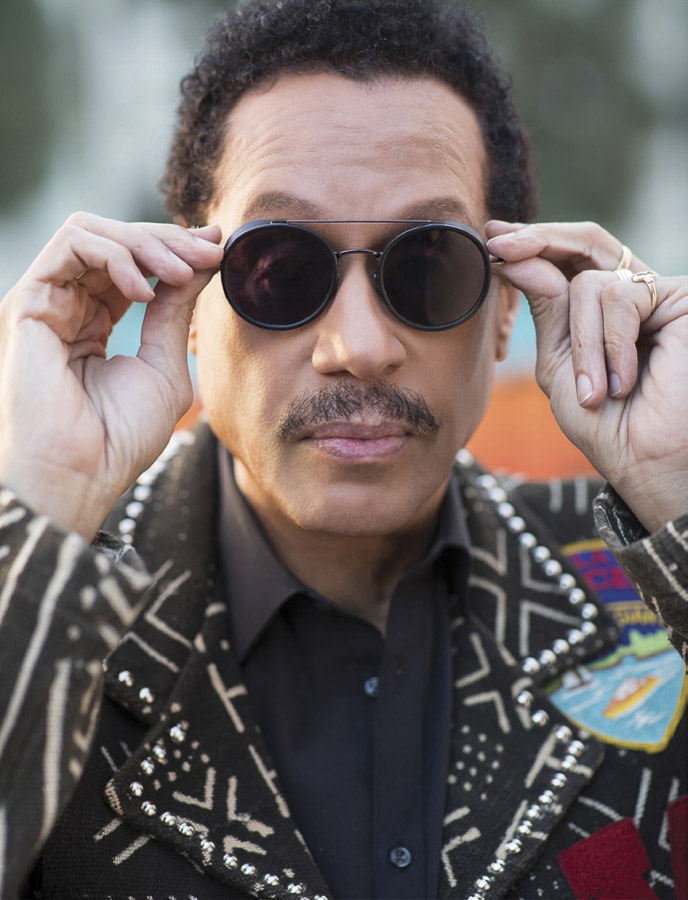
Interview by Kaylene Peoples | Responses by Larry Dunn
Kaylene Peoples: Larry, let’s talk about the music business now, the way it was when you got started and where it is today. I’d love to hear your thoughts.
Larry Dunn: I started playing at two years old, got in clubs at 11, and at 15, I played seven nights a week. So when I got with Maurice, and came out to LA, I knew nothing about the music business. One thing that I will say to everybody that’s involved or is going to be involved, learn how to write music. Luisa and I talked about when TLC had won five Grammys in one night, and they had to actually borrow money from Baby Face to get a place to stay out here to attend. And also (most people don’t even realize) even what’s so awesome is Whitney Houston only wrote maybe one or two songs her whole career. It’s okay because she’s that awesome. She’s still cleaning up on all those royalties.
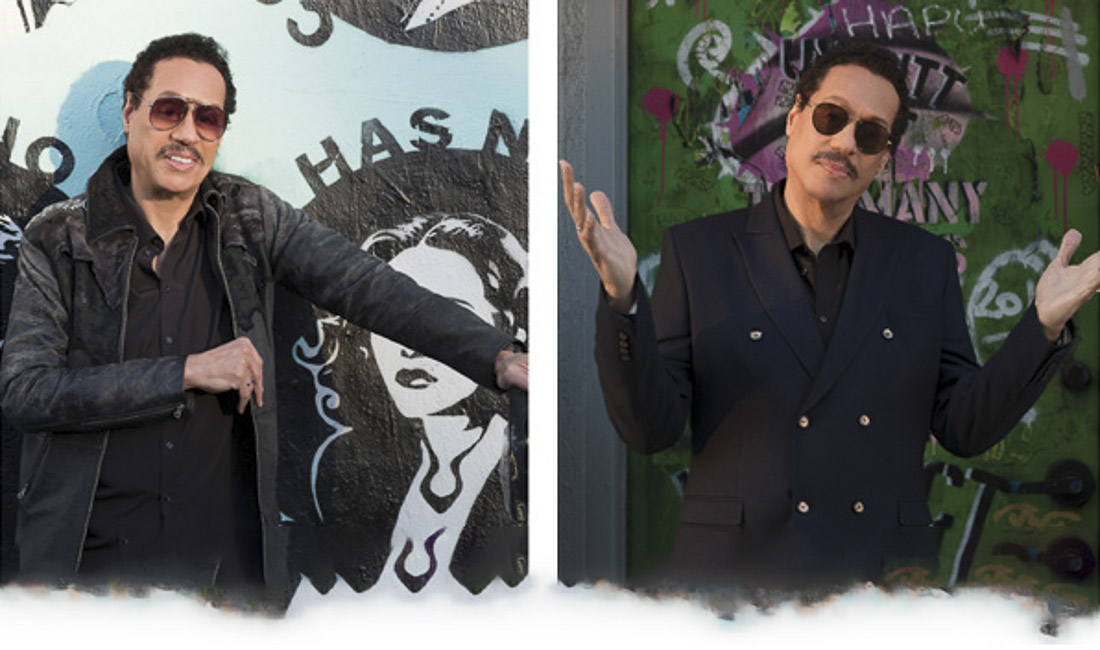
Larry Dunn (continued): A lot of artists aren’t going to have that kind of longevity. It’s in the writing and publishing. So you get a call from Quincy’s office and he says, “Michael Jackson loves your song and wants to do it, but he wants a percentage of the publishing. Now you have to have one of those IQs in the high single digits. Don’t say, “No.” Something like that, of course you share. But as much as you can, my advice would be to hold on to your publishing, and learn how to write music. Now, where the business took a shift was the advent of home studios, and also rap. And I’m sure the [record] companies were very happy with that, because now they just record in a home studio, and it’s a guy talking over a beat. And . . . (he raises his hand) it took off! Luisa can talk about that because she was raised in New York, and was there [at the time] and knew a lot of these guys. For me it took a shift when it went from spoken word and poets, and then you had the rap. There was the Sugar Hill Gang, and the lyrics were kind of fun . . . “Holiday Inn,” and then it took a shift. If they would’ve told me in the 1970s that eventually it was going to be a point where there were going to be some rhythms . . . great rhythms . . . some instrumentals, but the dialog would include the f-word, the b-word, I would have asked, “Am I on candid camera?” But that’s where we’re at. I I say at some of my concerts, “Every male who’s walked the planet, has walked, and will walk, there’s one common denominator: a mother. So I don’t know when they became “B’s and H’s,” but I’d say, “No, I don’t want to start a movement because Americans are losing a lot of rights as we sleep. So you do whatever you want to do. People ask what is our main motto. And it is simply the “I” word . . . integrity.
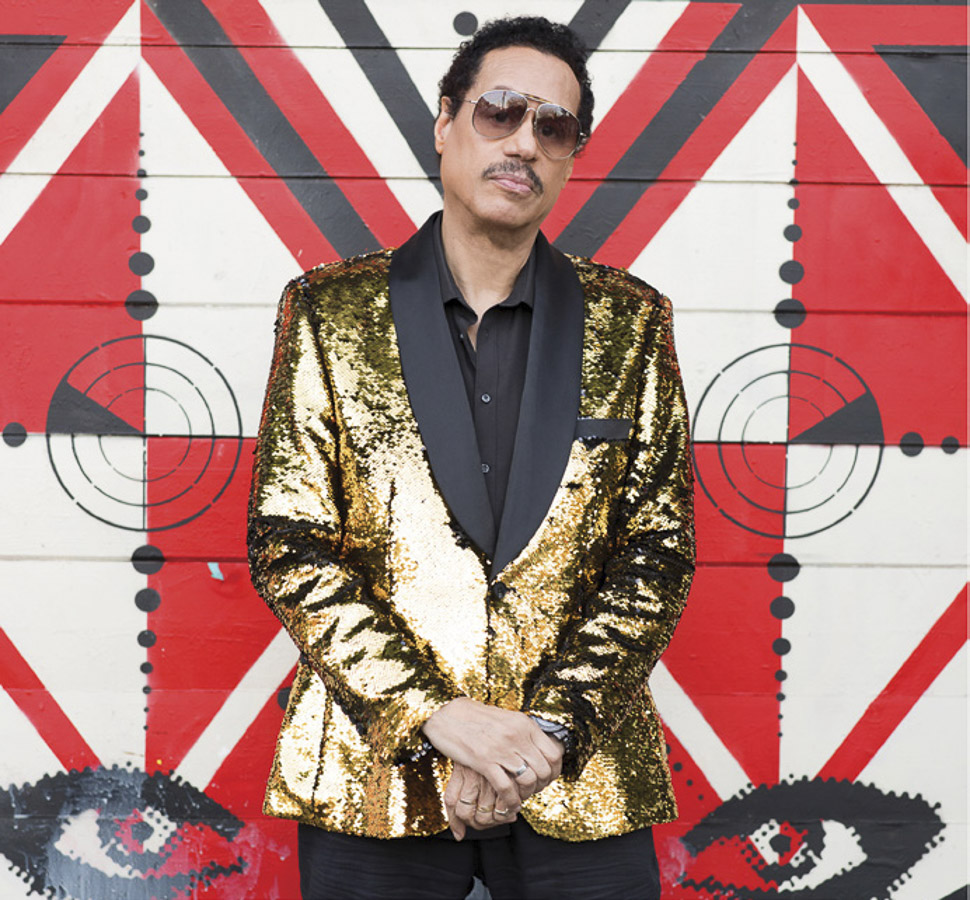
Larry Dunn (Continued): So anyway, the record company started changing the business, but the good thing is the generations that came before us, actually paved the way, because now the younger generation is more “hip” to the business; they’re getting a lot more royalties. That didn’t really happen back in the day. That’s why when Prince wrote “slave” on the side of his face, he recognized that this was some bull crap. So it got to that point. And now here we come with the advent of CDs. And I’m sure you remember that. This was record company propaganda. Record labels were pushing that they were the greatest thing. The sound is more incredible. You can play Frisbee. They don’t scratch. Bull, bull, bull . . . because they scratch terribly. My longtime engineer Chris Brunt, and these people that still exist, they spend a whole lot of money ($20,000) for a turntable, and it’s top notch still to this day. There is no CD in the world that’s going to sound as great as a good piece of vinyl that’s not scratched, and a great system, and a turntable. Why? Because it was much cheaper for them to get this little piece of plastic and put the music on there than it was to pay a lot more for that good vinyl. So the business changed in that way as well. And now you’re at the point where people are doing downloads. Some of us still want to hold it in our hand (even though it’s small), and actually read the credits. So that changed as well.
Kaylene Peoples: I do understand that they are starting to meta-tag in the downloads now when you right-click all the information.
Larry Dunn: Oh yeah, but some people like to hold it.
Kaylene Peoples: And the vinyl is making a comeback, a slow comeback but a comeback nonetheless.
Larry Dunn: Absolutely.
Kaylene Peoples: Sales for record players have boosted like 30 percent this year.
Larry Dunn: Lulu told me two years ago that vinyl went up 700 percent! That’s a great thing. And we definitely are going to print up some vinyl.
Kaylene Peoples: It’s actually more affordable now to do vinyl than it was back in the 70s. Now let’s talk about the songs that you wrote for Earth Wind & Fire. Larry, you were a composer as well for EWF. I’d love to hear about the songs you had a hand in creating.
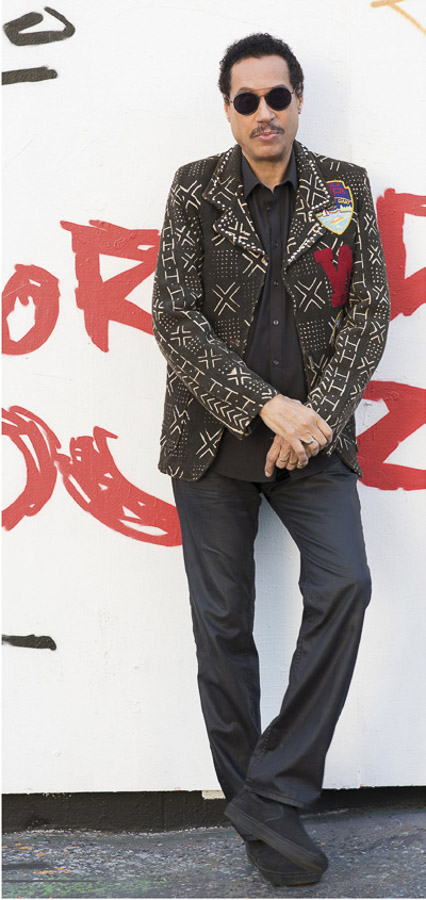
You mean the ones that I can remember? Ha ha ha…Actually one of the biggest ones was “Shining Star.” It was Maurice, myself, and Philip. That was awesome. I was 21-22 years old, and to look at Billboard magazine (a lot of people wouldn’t even know what I’m talking about), there were three major magazines that covered music in the 60s, 70s, and even early 80s. Cashbox, Record World, and Billboard. That was the holy grail of music. So to look at that and see “Shining Star” No. 1 R&B Record, No. 1 Pop Record . . . it was on That’s the Way of the World album, where I wrote “Help Them See the Light,” “Be Ever Wonderful,” “All About Love.” I actually started writing with Maurice when I was about 18. And then Maurice and I very quickly put together that arrangement on “Got to Get You Into My Life,” the title track for the album Spirit. Maurice was a drummer, so he had a great sense of rhythm. Me, being a keyboard player, and being blessed to be able to study with Walter Bishop, Jr. with that 12-tone technique, that was a great match there. I always worked my bootie off, being musical director at 21. Maurice would tell me I’ve done enough. And I’d always ask, “Are you sure?” The following week, I’d be in the studio with Stanley Turrentine, Lenny White, heroes Ramsey Lewis, Dee Dee Bridgewater, Diane Reeves, Level 42. I was so blessed to be able to work with so many artists. So music was always the deal. Finish with Earth, Wind & Fire off the road, and back in the studio working with other major artists and loving it.
Kaylene Peoples: What were some of the highs of being in Earth, Wind & Fire? Please share one or two really big highlights of your career with them?
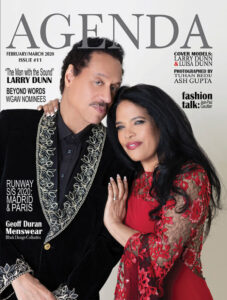 Larry Dunn: One of the biggest one’s was the California Jam with 225,000 people in Ontario, CA. There were so many people, they had to fly us in on a helicopter. They had all the top groups. They had stages on train tracks. It was brilliant. When one band would finish, they’d move it over. The next stage was already ready. They had it together. People asked if we were nervous. We weren’t nervous, because being an entertainer, as you probably know, the bigger the crowd, the less intimidated you are. So when you’re sitting on a stage looking at a quarter of a million people, it’s like [looking at] ants. I Tell people, “Look man, when we were kids, I had no idea that you got paid for doing this until I was about 11. Like Steve Martin (The Jerk), ‘Wow, these are my people, this is my music.’” And I say that in general about people period, old young, whatever, that want to get a job. And now, because of social media, the information highway, it’s like anything else. It’s got it’s good and it’s evil. So people look on the Internet to see what job pays the most, not taking into account, YOU MAY SUCK AT IT! You may hate it.
Larry Dunn: One of the biggest one’s was the California Jam with 225,000 people in Ontario, CA. There were so many people, they had to fly us in on a helicopter. They had all the top groups. They had stages on train tracks. It was brilliant. When one band would finish, they’d move it over. The next stage was already ready. They had it together. People asked if we were nervous. We weren’t nervous, because being an entertainer, as you probably know, the bigger the crowd, the less intimidated you are. So when you’re sitting on a stage looking at a quarter of a million people, it’s like [looking at] ants. I Tell people, “Look man, when we were kids, I had no idea that you got paid for doing this until I was about 11. Like Steve Martin (The Jerk), ‘Wow, these are my people, this is my music.’” And I say that in general about people period, old young, whatever, that want to get a job. And now, because of social media, the information highway, it’s like anything else. It’s got it’s good and it’s evil. So people look on the Internet to see what job pays the most, not taking into account, YOU MAY SUCK AT IT! You may hate it.
I tell people, “We’re all here and God loves us all the same, but everybody’s important.” And so NYC got brought to its knees with the garbage men who realized how important they were when they went on strike. When they came back, they were no longer garbage men. They were sanitation technicians. I just say pick something that you enjoy doing. And if it’s something that puts a smile on peoples’ faces, but for music, go for the music. Learn your craft. Learn how to write. Learn about the music business before you worry about how much bling bling you’re going to get or how big your house is going to be, how many Lamborghini’s you’re going to have. Learn your craft, and utilize the talent that God gave you. Put that first, and everything else will follow after that.
Kaylene Peoples: Any lows in your entire career?
When Earth, Wind & Fire started going left a little bit, one of the things I would say is the music at one point got a little too homogenized. It was still great music, but I think as a group, it lost some of its edge as far as funk. It was just a little too much sheen in the production—still awesome—still plays to this day, and people love it. So who am I to say? But that was just my personal thing.
Kaylene Peoples: Aside from the many accolades you’ve won: Lifetime Achievements, all the Grammys, and the Hall of Fames, would you list your favorites?
Larry Dunn: I can tell you right now. And my better half concurs. First of all, I thank God for all accolades. And I’ve been cut out of a lot of them that Earth, Wind & Fire received when members left and they regrouped with other members, except the Rock n’ Roll Hall of Fame and the Lifetime Grammy. I had six Grammys before that, all 32 Gold and Platinum [records], but when we got in 2010, the Songwriter’s Hall of Fame, that’s not only saying you were a member of an awesome group, but it wasn’t necessarily Earth, Wind & Fire, only the key writers: Maurice, me, Philip, Verdine, and Al Mckay. That says not only you were in a great group but, “You were a songwriting mother figure!”
Kaylene Peoples: Now, moving on that tip of songwriting, what inspires you when you write a song? What’s your process?
Larry Dunn: Well, you know what? It’s like what Chris Brunt said before. I forgot what project we were working on, but he, Luisa, and I were sitting right here. And he always said, “The only rule is there ain’t no rules.” So sometimes you may think of a beat, sometimes you get a melody, sometimes you may think of something, see something on TV or something driving down the street . . . and was Italian and my father was Black. Both of those ladies were so awesome in my life. But the black grandmother used to always say, “Whatever you do, put God first. And I will say that behind every great man . . . now I’m not saying I’m a great man, but behind every great man is a great woman. Then I say, “but no, behind every great man is a GREATER woman.” And I just say that my life took a huge turn, and it was just so beautiful and awesome when I met my wife.” So for all you guys out there, who want to kick your life up a notch, get you a great woman, and hopefully, a woman of God. You’ll see what will happen with your life, because it has changed mine immensely!
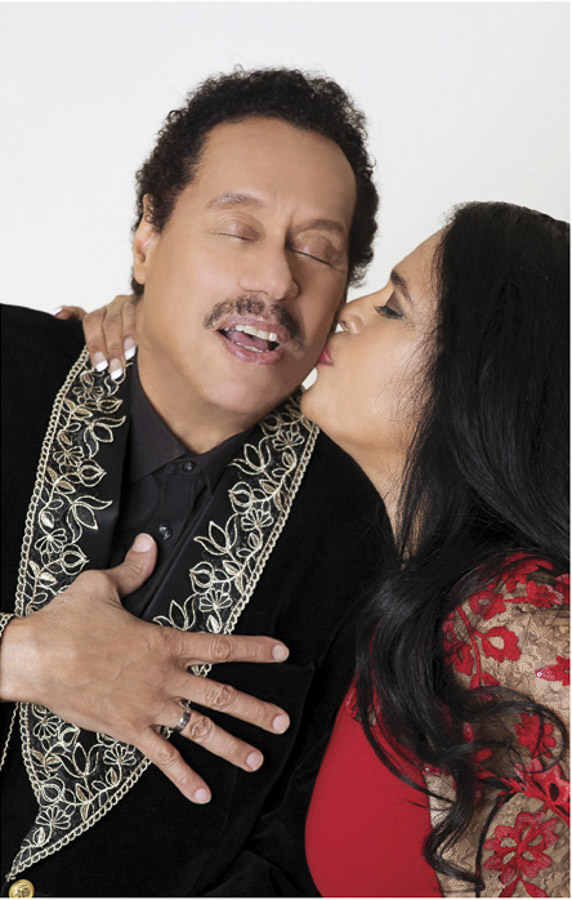
” . . . behind every great man is a GREATER woman. And I just say that my life took a huge turn, and it was just so beautiful and awesome“
In conclusion: Larry Dunn joined Earth, Wind & Fire (EWF) in 1971 at 18, and wrote many of their great songs, including their only Number 1 Pop hit “Shining Star.” On May 24, 1975, the 21-year-old Larry Dunn, together with Maurice White did the arrangement of the Beatles tune “Got to Get You Into My Life” for Sgt. Pepper’s Lonely Hearts Club Band; EWF appeared in the movie and performed the song. Larry was instrumental in creating the title tracks for the albums Spirit, the double album Faces, and many more. Dunn assumed the position of musical director at the age of 21!Decades later, the Larry Dunn Orchestra (LDO) performs the ultimate show with Larry Dunn’s Anthology of Earth, Wind & Fire. Past shows have had guest performances by Brian Culbertson, Stevie Wonder, Paulihno DeCosta, Ray Parker Jr., Ronnie Laws, Wayne Lindsey, and others. As the composer of many of the songs that catapulted the band to super stardom, including “Shining Star,” “Be Ever Wonderful,” “Jupiter,” and others, Larry’s list of accomplishments keeps growing. As the youngest and one of the longest members of Earth, Wind & Fire, Larry Dunn was the main composer and keyboardist. He was only 17 when he joined, and Dunn helped cultivate and create the award-winning sound of the band with the late Maurice White, Verdine White, and the other key members of the group. His latest CD entitled N2 The Journey is filled with lush arrangements and beautiful songwriting. Decorated with countless awards, Larry Dunn was inducted into the Denver Rock & Roll Hall of Fame, Song Writer’s Hall of Fame, and is the recipient of the Grammy’s Lifetime Achievement Award, not to mention the seven Grammys he received as a member of Earth Wind and Fire. Recently, the original nine members of Earth Wind and Fire, which included Larry, were inducted into the Smithsonian, and the band known for its longevity and multiple hits were celebrated at the Kennedy Center Honors December 2019.
AGENDA Issue 11 Print Magazine: https://www.amazon.com/Agenda-Feb-Mar-2020-Issue/dp/B084Z5HF5L | Get the digital magazine: https://payhip.com/b/CEhpi





This is a fantastic interview! Larry Dunn and EWF were such an influential and powerful force in so many of our lives as the soundtrack to our youth!
it’s so refreshing to hear Mr. Dunn speak to the issue of respect towards our mothers and also to the glorious audio quality found on records!
I recently released my first feature-length music documentary titled JazzTown which features Dianne Reeves and many other Colorado jazz legends . In one scene Larry Dunn’s brother Steve can be seen sitting in a booth at the infamous El Chapultepec jazz lounge!